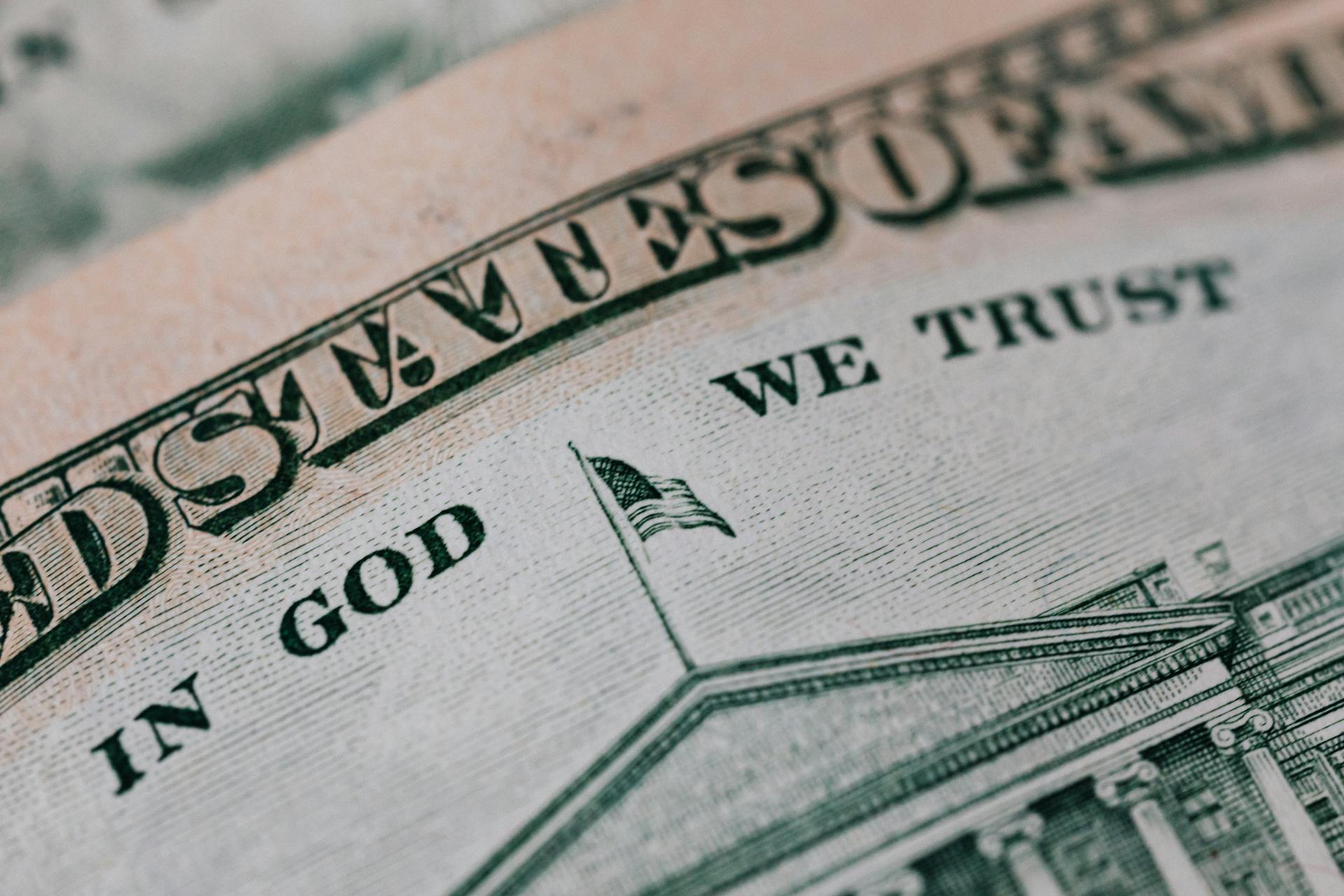
A collections agency is a company that specializes in recovering debts on behalf of a creditor. They are hired to track down individuals or businesses that owe money, and to negotiate payment plans or settlements.
Collections agencies use various methods to locate debtors, including contacting their employers, banks, and other creditors. They can also use public records and online searches to track down the person or business responsible for the debt.
If you're contacted by a collections agency, it's essential to respond promptly and honestly. The agency may be willing to work with you to set up a payment plan or settle the debt for a lower amount.
For your interest: Can You Use Hsa for Medical Bills in Collections
What is a Collections Agency?
A debt collection agency is a firm that helps businesses or creditors recover outstanding debts from businesses or individuals who have failed to make payments as agreed. They act as intermediaries, collecting delinquent debts and remitting them to the original creditor.
Collection agencies operate under legal frameworks and regulations that govern debt collection practices. These regulations ensure fair treatment of debtors while pursuing the recovery of owed funds.
Debt collection agencies typically employ strategic approaches to engage with debtors, negotiate repayment plans, and ensure regulatory compliance. This helps safeguard the business's cash flow and protect their bottom line.
In some cases, collection agencies may refer cases to lawyers who file lawsuits against customers who have refused to pay the debt. The Fair Debt Collection Practices Act (FDCPA) makes it illegal for debt collectors to harass, lie, or use unfair practices in attempting to collect a debt.
A fresh viewpoint: Fair Debt Collection Practices Act Attorneys Fees
Your Rights and Protections
Debt collectors are prohibited from using abusive or deceptive tactics to collect outstanding debt.
Debt collectors may not contact you at an unusual time or place, such as calling you at work if you've reported that you cannot take personal calls. They are also generally prohibited from calling consumers before 8 a.m. or after 9 p.m.
You might like: Collection Tips for Debt Collectors
Debt collectors are not allowed to publicly contact you about your outstanding debt on social media, but they can send you private messages unless you request them to stop.
If you seek attorney representation in dealing with the debt, the agency must stop contacting you and contact the attorney instead. However, you must give the agency your attorney's name and contact information.
Here are the ways you can report debt collectors who are engaging in harmful practices:
- File a complaint with the Consumer Financial Protection Bureau.
- File a complaint with the Federal Trade Commission.
- File a complaint with your state's attorney general.
Your Rights Under the FDCPA
The Fair Debt Collection Practices Act (FDCPA) is a federal law designed to protect consumers from predatory debt collection practices. It does not apply to business debt.
Debt collectors may not contact you at an unusual time or place, such as your workplace if you've asked them not to. They also can't call you before 8 a.m. or after 9 p.m.
Debt collectors are prohibited from publicly contacting you about your outstanding debt on social media. However, they can send you private messages unless you request they stop.
Debt collectors are not allowed to harass consumers, which includes repeated phone calls or messages.
If you're represented by an attorney, the debt collector must stop contacting you and contact the attorney instead. But you need to give them the attorney's name and contact information.
Here are some steps to report a debt collector who's engaging in harmful practices:
- File a complaint with the Consumer Financial Protection Bureau.
- File a complaint with the Federal Trade Commission.
- File a complaint with your state's attorney general.
If you win in federal court against a debt collector for deceptive practices, they'll pay your attorney fees and possibly damages.
Person
As a person, you have rights and protections when it comes to debt. You may be a debtor due to unforeseen events like the loss of a job or health problems.
Debtors can default on payments for various reasons, including a lack of financial planning or overcommitment. You may feel overwhelmed and unsure of how to manage your debt.
If you're a debtor, you may be subject to collection of consumer debt, which is regulated to protect your rights. This means that creditors must follow certain rules when trying to collect debts from you.
Check this out: What to Do When Credit Cards Go to Collections
Debtors may also dispute or disagree over the debt or what's being billed for. If you're in this situation, it's essential to communicate clearly with your creditor to resolve the issue.
As a debtor, you're not alone in facing financial challenges. Many people have been in your shoes and have found ways to manage their debt and get back on track.
The Bottom Line
Debt collectors and collection agencies have a legitimate purpose in helping creditors recover money they're owed. This is governed by both federal and state consumer protection laws.
Legitimate debt collectors will abide by these laws, which means you have rights and protections in place. Debt collection practices are regulated to prevent harassment and unfair treatment.
The Federal Trade Commission and Consumer Financial Protection Bureau are two key agencies that oversee debt collection practices. They provide guidance on what debt collectors can and can't do.
Here's a summary of what you can expect from debt collectors:
- Federal Trade Commission regulates the debt buying industry.
- Consumer Financial Protection Bureau explains what laws limit what debt collectors can say or do.
- Consumer Financial Protection Bureau defines harassment by a debt collector.
- Consumer Financial Protection Bureau explains what information debt collectors must provide about a debt.
- Federal Trade Commission provides FAQs on debt collection.
- Consumer Financial Protection Bureau explains if debt collectors can collect debts that are several years old.
Impact on Credit and Borrowers
An unpaid debt in collections can majorly impact your credit score. If you have a delinquent account, your creditor can report it to credit bureaus, resulting in a drop in your credit score.
Collections can stay on your credit report for up to seven years from the first delinquent date. The impacts of this account should lessen with time.
However, there are some instances when debt collections won't impact your credit score. Medical collection debt that has been paid off will no longer appear on your credit report.
Medical collection debt of $500 or less will no longer appear on credit reports. This change was made to reduce the burden of medical debt on credit scores.
A collection agency can update your credit report with a "collection" status, leading to a drop in your credit score. This can make it harder to get loans in the future.
Here are some examples of how a collection agency can try to retrieve funds:
- Calling the debtor's personal and office telephones
- Mailing numerous late-payment notices to the debtor
- Contacting a debtor's family, friends, and neighbors to confirm the debtor's contact information
- Appearing at the individual's front door
If the debt collector wins a lawsuit, it can get a court order to take money from your bank accounts or your paychecks.
How Credit is Affected
Having a debt in collections can significantly impact your credit score, with the later your payment is, the worse it will affect your credit. This is because your creditor can report it to credit bureaus, resulting in a drop in your credit score.
Collections can stay on your credit report for up to seven years from the first delinquent date, but the impacts of this account should lessen with time. After seven years, the account should fall off of your credit report.
Medical collection debt that has been paid off will no longer appear on your credit report, which is a welcome change. The credit bureaus have also increased the timeline for adding unpaid medical collection debt to your report from six months to one year.
A low credit score can affect your chances of obtaining a loan in the future, as an account in collections can remain on your credit report for seven years. Collection agencies deploy multiple strategies to try to retrieve funds, such as calling your phone, mailing late-payment notices, and even contacting your family and friends.
A unique perspective: How Long Can Collection Agencies Report to Credit Bureaus
Here are some key facts to keep in mind:
When Borrowers Pay
When borrowers pay their debts as a result of a collection agency's efforts, the creditor pays the collection agency a percentage of the funds recovered. This is based on the terms of their agreement.
The creditor's payment to the collection agency is typically a percentage of the funds or assets recovered. This means that the more a borrower pays, the more the collection agency stands to gain.
In some cases, the creditor may pay a flat fee to the collection agency, regardless of the amount recovered. This can provide a guaranteed income stream for the collection agency.
The payment terms between creditors and collection agencies vary widely, depending on the specific agreement in place.
When a Borrower Defaults
When a Borrower Defaults, the Consequences Can Be Severe.
A collection agency can update the borrower's credit report with a "collection" status, leading to a significant drop in their credit score.
This can have long-lasting effects, as an account in collections can remain on their credit report for seven years.
Collection agencies will stop at nothing to retrieve the funds, including calling the debtor's personal and office telephones, mailing numerous late-payment notices, and even contacting their family, friends, and neighbors to confirm their contact information.
They may also appear at the individual's front door, making it clear that they will use any means necessary to collect the debt.
If the debt collector wins a lawsuit, they can get a court order to take money from the borrower's bank accounts or paychecks.
This can be a devastating blow to someone who is already struggling to make ends meet.
In extreme cases, a collection agency can even sue you for the debt you owe.
A low credit score can make it extremely difficult to obtain a loan in the future, making it even harder to get back on your feet.
Here are some common strategies collection agencies use to try to retrieve funds:
- Calling the debtor's personal and office telephones
- Mailing numerous late-payment notices to the debtor
- Contacting a debtor's family, friends, and neighbors to confirm the debtor's contact information
- Appearing at the individual's front door
Interacting with Collectors
If a collector contacts you, don't panic. You have a few options to navigate the situation.
Confirm that the debt is yours by requesting a debt validation letter from the collector. This letter will outline the debt, including the amount owed, type of debt, and creditor details.
You have 30 days to dispute any errors in the letter. If the debt is yours, explore your payment options, which typically include paying off the balance in a lump sum or with a repayment plan.
To choose the best option, calculate how much you can reasonably put down and consider negotiating a repayment plan for less than what you owe.
Here are the practical steps to take when a collector contacts you:
- Confirm the debt is yours
- Explore your payment options
- Begin making payments with a written agreement
Collector Contact: Steps to Take
If a debt collector has contacted you, it's natural to feel stressed and anxious. Luckily, there is assistance available to help you navigate the collection process.
You can start by reviewing the CFPB's debt collection help resource, which offers plenty of information for consumers in the collection process.
Expand your knowledge: Paying off a Collection Account and Credit Score
The first step is to confirm that the debt is yours. The FDCPA requires debt collection agencies to send you a debt validation letter before you pay anything, which will outline how much is owed, the type of debt owed, and other important information.
You have 30 days to dispute any errors in the debt validation letter.
Here are the practical steps to take:
- Confirm that the debt is yours by reviewing the debt validation letter sent by the debt collection agency.
- Explore your payment options, which typically include paying off your balance in a lump sum or with a repayment plan.
- Begin making payments once you've received a written agreement from the debt collector and have reviewed the information for accuracy.
Before making any payments, contact your debt collector and ask for a written agreement. This will ensure that you both are on the same page and will help you keep track of your payments.
Can a Collector Take Money From My Paycheck?
Debt collectors cannot take money from your paycheck unless they have authorization to garnish your wages through a court order.
If a collector is trying to take money from your paycheck without a court order, you have the right to refuse.
Choosing and Working with Agencies
Choosing a collection agency requires some research and due diligence. Consider hiring a reputable agency that's experienced in recovering outstanding debts.
Debt collection agencies are experts in recovering outstanding debts, with a deep understanding of debt collection strategies and negotiation techniques. They can effectively employ these strategies to recover funds on behalf of businesses.
When choosing a collection agency, define your debt collection needs, including the urgency and timeline for recovering the debts. Research potential agencies through referrals, online searches, and read reviews and testimonials to make an informed decision.
Compare custom quotes and proposals from the top choices, evaluating factors such as experience, track record, compliance with regulations, proposed collection strategies, communication methods, fee structures, and additional services offered.
Here are some key factors to consider when evaluating a collection agency:
By considering these factors, you can choose a collection agency that best meets your criteria and offers the most effective solution for recovering outstanding debts.
How to Choose
To choose a debt collection agency, define your debt collection needs by analyzing the outstanding debts owed to your business and determining the urgency and timeline for recovering the debts.

Start by researching potential agencies through referrals, online searches, and reading reviews and testimonials to check their reputation, experience, and track record in the debt collection industry.
Contact your top choices to request custom quotes, providing details about your specific debt collection needs, including the types of debts, volume, and any unique requirements.
Compare the custom quotes and proposals received from the debt collection agencies, evaluating factors such as their experience, track record, compliance with regulations, proposed collection strategies, communication methods, fee structures, and additional services offered.
Choose the debt collection agency that best meets your criteria and offers the most effective solution for recovering outstanding debts.
Benefits of Working
Working with a debt collection agency can be a game-changer for businesses, freeing up valuable time to focus on core operations and growth strategies.
Debt collection agencies are experts in recovering outstanding debts, with a deep understanding of debt collection strategies and negotiation techniques. They know how to handle the process well and can effectively employ legal frameworks to recover funds on behalf of businesses.
Outsourcing debt collection tasks to an agency allows businesses to redirect their efforts towards improving customer satisfaction, developing new products or services, or enhancing their marketing campaigns. This optimizes overall productivity and efficiency, leading to long-term growth and success.
Debt collection agencies are well-versed in the laws and regulations governing collection practices, reducing the risk of legal issues for businesses. They stay up-to-date with the ever-evolving legal landscape surrounding debt collection.
Here are the key benefits of working with a debt collection agency:
- Expertise in recovering outstanding debts
- Freeing up time for core operations and growth strategies
- Reduced risk of legal issues
- Professionalism in interactions with debtors
By hiring a reputable collection agency, businesses can mitigate potential legal risks and maintain a strong reputation within their industry.
Types and Practices of Agencies
Types of collection agencies include first-party agencies, which are departments or subsidiaries of the original creditor, and third-party agencies, which are independent firms hired by creditors.
First-party agencies often prioritize maintaining positive customer relationships and may offer more flexibility in approaching debt recovery. They typically handle early-stage delinquencies.
Third-party agencies, on the other hand, are hired by creditors to collect debts on their behalf after they have been delinquent for a certain period of time. They are not affiliated with the original creditor beyond the contractual relationship for debt collection services.
Debt buyers are another type of collection agency, which purchase delinquent debts from creditors or other collection agencies at a discounted rate. They become the new creditor and attempt to recover as much of the debt as possible.
Here's a breakdown of the types of collection agencies:
Collection agencies work on a contingency-fee basis, meaning they only get paid if they successfully collect the debt. The fee can range from 10% to 50% of the amount collected, depending on the type of debt and the agreement between the creditor and the collection agency.
Practices
Debt collection agencies can be hired by creditors to collect debts they are owed, but have been unable to collect through their own efforts. They can recover debts such as credit card accounts, medical bills, loans, and unpaid utility bills.

Debt collectors may refer cases to lawyers who file lawsuits against debtors who have refused to pay. Some collection agencies work on their own behalf, buying delinquent debt from the original creditor and attempting to recover as much of it as possible.
Debt collectors must send a written notice called a debt validation letter within five days of their first attempt to contact you, including the amount you owe, the name of your original creditor, and a statement of your right to dispute the debt.
Debt collectors can contact you with information on file, including your current or previous address, phone number, and relatives' contact information. They may also use personal banking information to assess your ability to repay the debt.
Some states allow wage garnishment to collect eligible debts. Debt collectors may use aggressive tactics to convince debtors to pay, but these practices are regulated by law.
Debt collectors who work on commission may be highly motivated to convince debtors to pay the debt. Collection agencies are sometimes allowed to contact individuals other than the debtor, usually in an attempt to locate the debtor but without mentioning the debt.
Here are some types of collection agencies:
- First-party agencies: departments or subsidiaries of the original creditor or the business
- Third-party agencies: independent firms hired by creditors to collect debts on their behalf after they have been delinquent for a certain period of time
- Debt buyers: entities that purchase delinquent debts from creditors or other collection agencies at a discounted rate
Prohibited Agency Activities

Debt collection agencies are regulated by the Fair Debt Collection Practices Act (FDCPA), which sets strict rules on how they can operate.
One thing debt collection agencies are not allowed to do is harass or threaten debtors with violence or harm. They also can't use obscene or profane language when communicating with debtors.
Collection agencies can't disclose information about the debt to third parties or the public without the debtor's consent or a valid court order. This means that a creditor can't share your debt with others without your permission.
Collection agencies are restricted in their communication with debtors. They can only call between 8 a.m. and 9 p.m. and not during unreasonable hours. They also can't contact debtors repeatedly at their workplace if the debtor has indicated that such calls are not allowed.
Here are some specific things that debt collection agencies can't do:
- Harass or threaten debtors with violence or harm
- Use obscene or profane language
- Disclose information about the debt to third parties or the public without consent or a court order
- Call between 8 a.m. and 9 p.m. only and not during unreasonable hours
- Contact debtors repeatedly at their workplace if they've indicated such calls are not allowed
- Falsely represent themselves as government officials, law enforcement officers, or attorneys
- Falsely claim that a debtor has committed a crime
- Say they will be arrested if the debtor doesn't repay the debt
- Add unauthorized fees or interest to the debt
International
International debt collection is a specialized field that requires a deep understanding of multiple languages and legal systems.

Not many companies specialize in international debt collection due to the complexity of communicating with debtors in foreign languages and navigating different laws and regulations.
Collection may require employees to communicate in multiple languages, which can be a significant challenge even for experienced collectors.
Debt collectors may partner with foreign debt collection agencies that are familiar with the laws and languages of the nation in which they operate, allowing debt collection to occur through a local agency even when the debtor is in a different nation.
Readers also liked: International Debt Collection Laws
Re-Aging
A debt collector may attempt to revive a debt that has expired due to the statute of limitations by making a payment on the debt themselves.
This payment, often in a small amount, may appear on a credit card statement as an "agency payment" or "transactional payment".
It may also be referred to as a "phantom payment" since it is made by the collection agency without the knowledge or permission of the debtor.
An agency payment does not extend the statute of limitations beyond the last date when the debtor personally made a payment on the debt.
A court is likely to disregard an agency payment when a debtor claims that the debt is expired under an applicable statute of limitations.
Frequently Asked Questions
What happens if you get sent to collections?
When sent to collections, your account balance becomes $0, but a new collection account appears on your credit report, and a collection agency will contact you to collect the debt
Sources
- https://www.bankrate.com/personal-finance/debt/what-is-debt-collection/
- https://www.highradius.com/resources/Blog/what-debt-collection-agencies-do/
- https://www.investopedia.com/terms/c/collectionagency.asp
- https://www.investopedia.com/articles/personal-finance/121514/how-debt-collection-agency-business-works.asp
- https://en.wikipedia.org/wiki/Debt_collection
Featured Images: pexels.com

